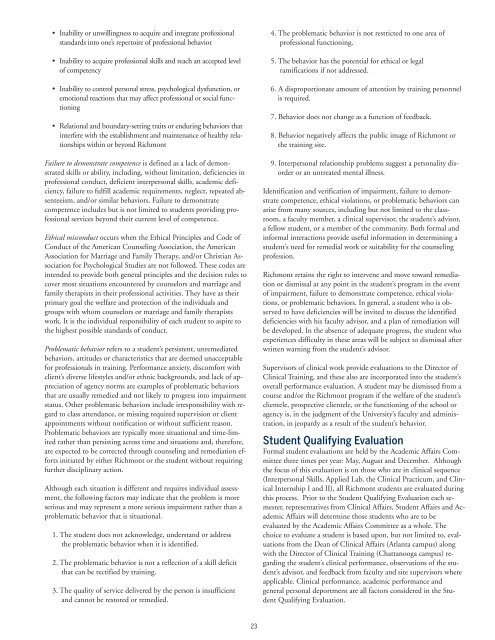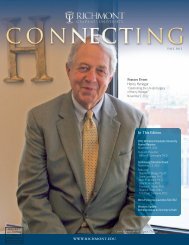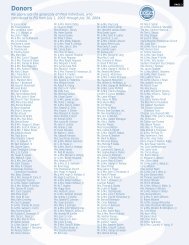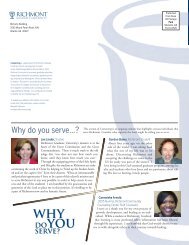Graduate Catalog 2010-2012 - Richmont Graduate University
Graduate Catalog 2010-2012 - Richmont Graduate University
Graduate Catalog 2010-2012 - Richmont Graduate University
You also want an ePaper? Increase the reach of your titles
YUMPU automatically turns print PDFs into web optimized ePapers that Google loves.
• Inability or unwillingness to acquire and integrate professional<br />
standards into one’s repertoire of professional behavior<br />
• Inability to acquire professional skills and reach an accepted level<br />
of competency<br />
• Inability to control personal stress, psychological dysfunction, or<br />
emotional reactions that may affect professional or social functioning<br />
• Relational and boundary-setting traits or enduring behaviors that<br />
interfere with the establishment and maintenance of healthy relationships<br />
within or beyond <strong>Richmont</strong><br />
Failure to demonstrate competence is defined as a lack of demonstrated<br />
skills or ability, including, without limitation, deficiencies in<br />
professional conduct, deficient interpersonal skills, academic deficiency,<br />
failure to fulfill academic requirements, neglect, repeated absenteeism,<br />
and/or similar behaviors. Failure to demonstrate<br />
competence includes but is not limited to students providing professional<br />
services beyond their current level of competence.<br />
Ethical misconduct occurs when the Ethical Principles and Code of<br />
Conduct of the American Counseling Association, the American<br />
Association for Marriage and Family Therapy, and/or Christian Association<br />
for Psychological Studies are not followed. These codes are<br />
intended to provide both general principles and the decision rules to<br />
cover most situations encountered by counselors and marriage and<br />
family therapists in their professional activities. They have as their<br />
primary goal the welfare and protection of the individuals and<br />
groups with whom counselors or marriage and family therapists<br />
work. It is the individual responsibility of each student to aspire to<br />
the highest possible standards of conduct.<br />
Problematic behavior refers to a student’s persistent, unremediated<br />
behaviors, attitudes or characteristics that are deemed unacceptable<br />
for professionals in training. Performance anxiety, discomfort with<br />
client’s diverse lifestyles and/or ethnic backgrounds, and lack of appreciation<br />
of agency norms are examples of problematic behaviors<br />
that are usually remedied and not likely to progress into impairment<br />
status. Other problematic behaviors include irresponsibility with regard<br />
to class attendance, or missing required supervision or client<br />
appointments without notification or without sufficient reason.<br />
Problematic behaviors are typically more situational and time-limited<br />
rather than persisting across time and situations and, therefore,<br />
are expected to be corrected through counseling and remediation efforts<br />
initiated by either <strong>Richmont</strong> or the student without requiring<br />
further disciplinary action.<br />
Although each situation is different and requires individual assessment,<br />
the following factors may indicate that the problem is more<br />
serious and may represent a more serious impairment rather than a<br />
problematic behavior that is situational.<br />
1. The student does not acknowledge, understand or address<br />
the problematic behavior when it is identified.<br />
2. The problematic behavior is not a reflection of a skill deficit<br />
that can be rectified by training.<br />
3. The quality of service delivered by the person is insufficient<br />
and cannot be restored or remedied.<br />
4. The problematic behavior is not restricted to one area of<br />
professional functioning.<br />
5. The behavior has the potential for ethical or legal<br />
ramifications if not addressed.<br />
6. A disproportionate amount of attention by training personnel<br />
is required.<br />
7. Behavior does not change as a function of feedback.<br />
8. Behavior negatively affects the public image of <strong>Richmont</strong> or<br />
the training site.<br />
9. Interpersonal relationship problems suggest a personality disorder<br />
or an untreated mental illness.<br />
Identification and verification of impairment, failure to demonstrate<br />
competence, ethical violations, or problematic behaviors can<br />
arise from many sources, including but not limited to the classroom,<br />
a faculty member, a clinical supervisor, the student’s advisor,<br />
a fellow student, or a member of the community. Both formal and<br />
informal interactions provide useful information in determining a<br />
student’s need for remedial work or suitability for the counseling<br />
profession.<br />
<strong>Richmont</strong> retains the right to intervene and move toward remediation<br />
or dismissal at any point in the student’s program in the event<br />
of impairment, failure to demonstrate competence, ethical violations,<br />
or problematic behaviors. In general, a student who is observed<br />
to have deficiencies will be invited to discuss the identified<br />
deficiencies with his faculty advisor, and a plan of remediation will<br />
be developed. In the absence of adequate progress, the student who<br />
experiences difficulty in these areas will be subject to dismissal after<br />
written warning from the student’s advisor.<br />
Supervisors of clinical work provide evaluations to the Director of<br />
Clinical Training, and these also are incorporated into the student’s<br />
overall performance evaluation. A student may be dismissed from a<br />
course and/or the <strong>Richmont</strong> program if the welfare of the student’s<br />
clientele, prospective clientele, or the functioning of the school or<br />
agency is, in the judgment of the <strong>University</strong>’s faculty and administration,<br />
in jeopardy as a result of the student’s behavior.<br />
Student Qualifying Evaluation<br />
Formal student evaluations are held by the Academic Affairs Committee<br />
three times per year: May, August and December. Although<br />
the focus of this evaluation is on those who are in clinical sequence<br />
(Interpersonal Skills, Applied Lab, the Clinical Practicum, and Clinical<br />
Internship I and II), all <strong>Richmont</strong> students are evaluated during<br />
this process. Prior to the Student Qualifying Evaluation each semester,<br />
representatives from Clinical Affairs, Student Affairs and Academic<br />
Affairs will determine those students who are to be<br />
evaluated by the Academic Affairs Committee as a whole. The<br />
choice to evaluate a student is based upon, but not limited to, evaluations<br />
from the Dean of Clinical Affairs (Atlanta campus) along<br />
with the Director of Clinical Training (Chattanooga campus) regarding<br />
the student’s clinical performance, observations of the student’s<br />
advisor, and feedback from faculty and site supervisors where<br />
applicable. Clinical performance, academic performance and<br />
general personal deportment are all factors considered in the Student<br />
Qualifying Evaluation.<br />
23





